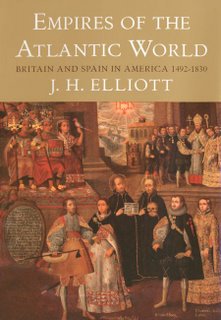 Yet more memories from Tory Historian’s education. Another name to conjure with was J. H. Elliott, who had written about Imperial Spain. Professor Elliott, I am delighted to report, is still alive and very active, having just produced a new tome: “Empires of the Atlantic World”.
Yet more memories from Tory Historian’s education. Another name to conjure with was J. H. Elliott, who had written about Imperial Spain. Professor Elliott, I am delighted to report, is still alive and very active, having just produced a new tome: “Empires of the Atlantic World”.
This is a comparison between the Spanish and the British Empires in the Americas and some speculation about the reasons why they might have developed differently. As the TLS review by Fernando Cervantes points out, there is also a certain amount counter-factual speculation towards the end of the tome.
What would have happened if Henry VII had agreed to sponsor Christopher Columbus’s first voyage or if it had been an English expeditionary force that conquered Mexico? Would there have been a reversal in the two countries? Would England have remained Catholic, the strongest and most active of them in Europe? Or would the inherent national characteristics triumphed and there would have been a direct reversal?
“Would Latin America be a thrifty and pluralistic society, firmly entrenched in the capitalist economy of the First World, while North America was a collection of heavily indebted enclaves of outmoded forms of baroque culture?”How much of the different developments depended on the greater and more integrated control from Madrid than from London (though many of the local agents managed to lose instructions from both)? According to the reviewer this control worked towards the benefit of the Latin American colonies at the beginning. In the seventeenth and early eighteenth century they flourished, were considerably more civilized and, even, humane, especially towards the native population and the slaves. Once the control disappeared, however, it was the North American colonies that began to flourish, using the ideas they had imported and the structures under which they had lived. And the problem of slavery has not yet been tackled properly in many of the Latin American countries.
This is not the first comparison of this kind. After all, the difference between the two parts of the Americas is extraordinary and there have to be explanations for that. The first historian to raise the subject was Claudio Veliz in his “The New World of the Gothic Fox”, a book that became one of the basic texts of the Anglospheric thinking.
“According to Véliz, the dominant cultural achievements of Europe's English- and Spanish-speaking peoples have been the Industrial Revolution and the Counter-Reformation, respectively. These overwhelming cultural constructions have strongly influenced the subsequent historical developments of their great cultural outposts in North and South America. The British brought to the New World a stubborn ability to thrive on diversity and change that was entirely consistent with their vernacular Gothic style. The Iberians, by contrast, brought a cultural tradition shaped like a vast baroque dome, a monument to their successful attempt to arrest the changes that threatened their imperial moment.”It will be interesting to see to what extent Professor Elliott agrees with Claudio Veliz.
0 comments